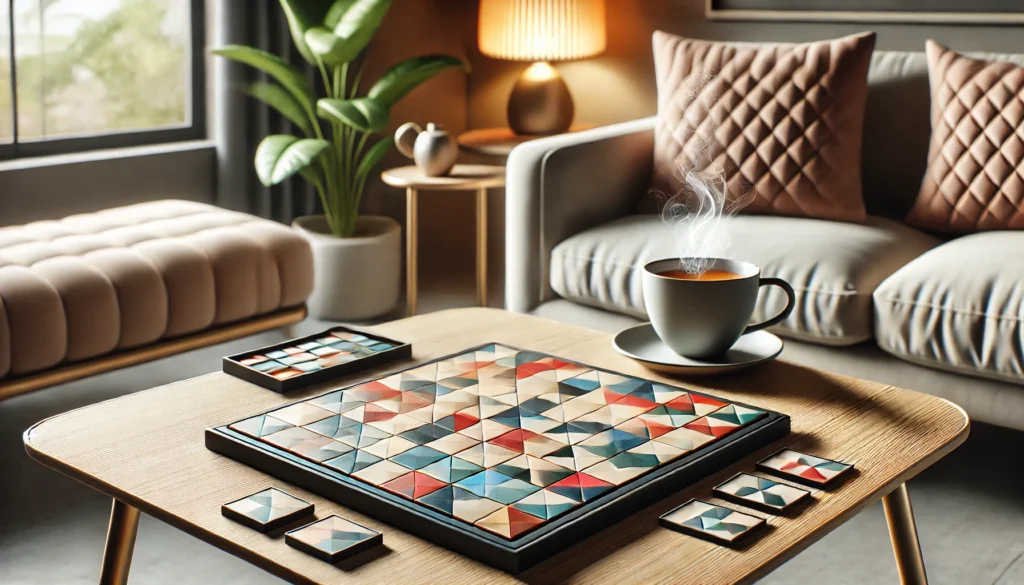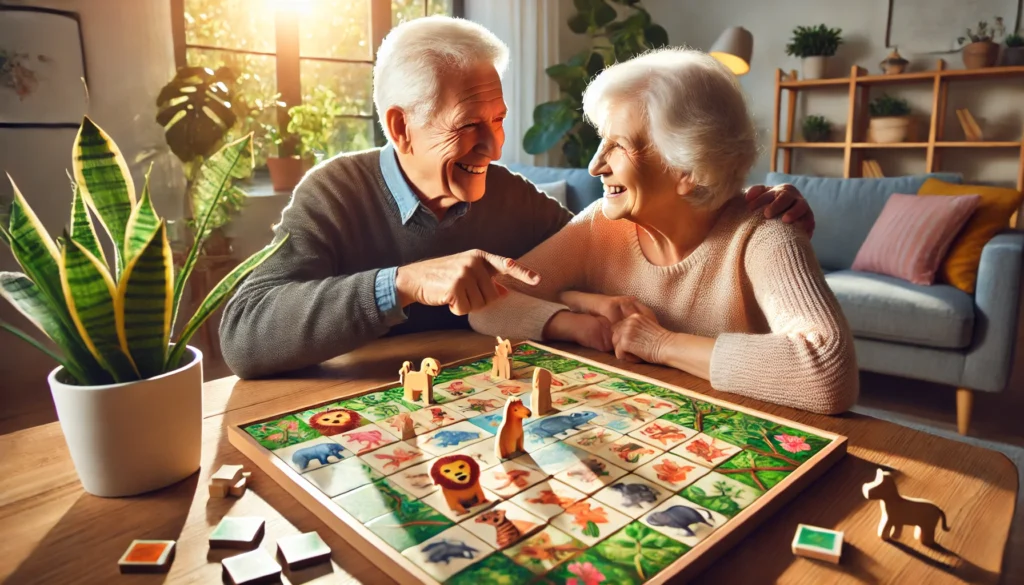Memory board games are not just for children; they have significant cognitive benefits for adults as well. The science is clear: engaging in activities that challenge your memory can improve brain function and potentially delay the onset of cognitive decline.
You may also like: Effective Techniques for Memory Practice Improvement
Cognitive Benefits of Memory Board Games
Memory board games are designed to enhance various cognitive skills, including memory, attention, and problem-solving. They stimulate the brain, encouraging neuroplasticity—the brain’s ability to form and reorganize synaptic connections, especially in response to learning or experience.
Memory Enhancement
These games require players to recall and recognize patterns, which strengthens memory pathways. By regularly exercising memory recall, players can improve their short-term and long-term memory capabilities. This regular mental exercise helps in reinforcing neural connections, making it easier to store and retrieve information. Moreover, memory games provide a structured environment for the brain to practice memory skills, which can translate into improved academic or professional performance.
Attention and Focus
Memory games often involve complex patterns and strategies that require sustained attention and focus. This helps enhance concentration and attention span, skills that are increasingly valuable in our fast-paced world. By honing these skills, players become better equipped to handle tasks that require extended periods of focus, reducing the likelihood of distraction. Furthermore, these games encourage mindfulness, allowing individuals to be present and fully engaged in the task at hand.
Problem-Solving Skills
Many memory board games incorporate elements of strategy and problem-solving, requiring players to plan their moves and anticipate opponents’ actions. This promotes critical thinking and decision-making skills. These games challenge players to think several steps ahead, fostering a strategic mindset that can be applied in everyday decision-making scenarios. Additionally, they offer opportunities to practice adaptive thinking, adjusting strategies as new information becomes available.
The Role of Neuroplasticity
Neuroplasticity is a key concept in understanding how memory board games can enhance cognitive skills. Our brains are incredibly adaptable, capable of changing and developing new pathways in response to new challenges.
Stimulating Brain Growth
By engaging with memory board games, we stimulate this plasticity, leading to improved cognitive function. These games provide a dynamic environment for the brain to form new connections and strengthen existing ones. This continuous process of adaptation and learning is crucial for maintaining cognitive health as we age.
Neuroplasticity in Everyday Life
The principles of neuroplasticity extend beyond gaming; they can impact various aspects of life, from learning a new language to picking up a musical instrument. Memory board games offer a practical way to harness this natural ability of the brain, providing a foundation for lifelong learning and adaptability.
Long-Term Cognitive Benefits
Research suggests that activities promoting neuroplasticity, like memory board games, can have long-term benefits, potentially reducing the risk of cognitive decline. By keeping the brain active and engaged, these games may contribute to a healthier aging process, preserving cognitive function well into later life.
Historical Context and Evolution
Memory games have a rich history, with roots tracing back to ancient civilizations. Historically, these games were used as educational tools, designed to train the mind and improve memory.
Ancient Origins
Many ancient cultures, including the Greeks and Chinese, developed early forms of memory games as part of their educational systems. These games often involved memorization and recall, serving as training tools for scholars and leaders. They were not only a source of entertainment but also a vital part of intellectual development.
Evolution Over Time
Over time, memory games have evolved, incorporating new elements and strategies while maintaining their core objective of cognitive enhancement. The introduction of printed materials and later digital formats has expanded the scope and accessibility of these games. Despite technological advancements, the fundamental principles of memory games have remained unchanged, emphasizing mental challenge and skill development.
Modern Adaptations
Today’s memory games reflect the diverse influences of past generations while embracing modern technology and innovation. From traditional board setups to virtual reality experiences, memory games continue to evolve, offering new ways to engage and challenge the mind.

Popular Memory Board Games for Adults
While many may associate memory board games with children, there are numerous options tailored for adults that offer more complex challenges and greater cognitive benefits.
Classic Memory Games
Classic memory games have stood the test of time, providing simple yet effective ways to enhance cognitive skills.
Concentration (Pairs)
A classic game that involves matching pairs of cards. This game is excellent for improving visual memory and concentration. Players must remember the location of cards and match them in pairs, a task that requires both patience and attention to detail. It’s a timeless game that can be easily adapted for different skill levels and ages.
Simon
In this electronic game, players must remember and replicate increasingly complex sequences of lights and sounds. It’s a great way to enhance short-term memory and attention. By challenging players to recall patterns, Simon helps improve memory retention and boosts cognitive agility, making it an engaging and stimulating exercise for the brain.
Chess
While primarily a strategy game, chess requires significant memory skills, particularly in remembering moves and anticipating opponents’ strategies. Chess players must recall vast amounts of information and apply it strategically, making it an excellent tool for developing memory and analytical skills.
Modern Memory Board Games
Modern memory board games incorporate innovative designs and mechanics to challenge and stimulate the brain.
Cortex Challenge
This game involves a series of mini-challenges that test various cognitive skills, including memory, speed, and observation. Cortex Challenge offers a diverse range of tasks that keep players engaged and mentally active. Its fast-paced nature encourages quick thinking and adaptability, providing a comprehensive workout for the brain.
Memoir ’44
A historical board game that combines strategy and memory. Players must remember card sequences and strategize their moves based on historical scenarios. This game offers a rich blend of storytelling and cognitive challenge, requiring players to balance memory recall with strategic planning.
Zooloretto
A game that requires players to manage a zoo, remembering animal placements and planning ahead to maximize their zoo’s success. Zooloretto combines memory with resource management, offering a unique challenge that tests both creativity and cognitive skills. The game’s dynamic nature encourages players to think critically and adapt to changing circumstances.
Emerging Trends in Memory Games
The world of memory board games is continuously evolving, with developers incorporating new technologies and concepts to enhance cognitive benefits.
Virtual Reality (VR) Integration
Virtual reality is beginning to play a role, offering immersive experiences that challenge the brain in novel ways. VR memory games provide a multisensory environment that can enhance engagement and focus. By immersing players in realistic scenarios, VR can amplify the cognitive challenges of traditional memory games.
Augmented Reality (AR) Applications
Augmented reality adds a new dimension to memory games by overlaying digital elements onto the physical world. AR can enhance the interactive elements of memory games, providing players with unique challenges that blend the real and virtual worlds. This technology opens up new possibilities for creative and engaging game design.
Personalized Gaming Experiences
Developers are exploring personalized gaming experiences that adapt to an individual’s cognitive strengths and weaknesses. By tailoring challenges to the player’s unique profile, these games can offer targeted cognitive enhancement. This personalized approach can maximize the effectiveness of memory games, providing customized pathways for cognitive development.

Practical Advice for Incorporating Memory Board Games into Daily Life
Integrating memory board games into your routine can be a fun and effective way to boost cognitive skills. Here are some tips:
Regular Play
Consistency is key. Aim to play memory board games regularly to keep your brain challenged and engaged. Regular play can help establish a routine that supports cognitive health, much like regular physical exercise benefits the body. By making memory games a habitual part of your life, you can continuously work on improving cognitive skills.
Diverse Selection
Rotate between different games to target various cognitive skills. Each game offers unique challenges that can stimulate different areas of the brain. This diversity ensures a well-rounded cognitive workout, preventing monotony and keeping your brain engaged and motivated. Exploring different games can also introduce you to new skills and strategies.
Social Interaction
Play with friends or family. Social interaction has its own cognitive benefits, and playing games together can enhance the experience and cognitive gains. Group play encourages communication, collaboration, and healthy competition, all of which contribute to cognitive development. Sharing the experience with others can also make gaming more enjoyable and rewarding.
Challenge Yourself
As you become more skilled at a particular game, increase the difficulty level to continue challenging your brain and promoting neuroplasticity. This constant pursuit of challenge ensures that your brain remains engaged and actively learning. By pushing your limits, you can stimulate cognitive growth and improve problem-solving skills.
Mindfulness and Relaxation
Remember that while the primary goal is cognitive enhancement, the games should also be enjoyable. Use them as a way to relax and disconnect from daily stresses. Enjoying the process can enhance motivation and make cognitive training a positive and fulfilling experience. Balancing challenge with enjoyment ensures that gaming remains a sustainable part of your routine.

Conclusion
Memory board games offer a unique and engaging way to enhance cognitive skills. They are a perfect blend of fun and mental exercise, providing significant benefits for brain health. By incorporating these games into your routine, you can improve memory, attention, and problem-solving skills while enjoying quality time with loved ones. As research in cognitive science progresses, the potential of memory games to enhance brain function will only continue to grow, offering exciting possibilities for cognitive development and mental health.
In an era where maintaining cognitive health is more important than ever, memory board games serve as a valuable tool, bridging the gap between entertainment and mental enhancement. So, why not pick up a game today and start reaping the cognitive benefits? Your brain will thank you.
Further Reading:
Top 10 Memory Games – with Tom Vasel
The Best Family Board Games that Test Your Memory
Board Games for Memory Improvement
Important Note: The information contained in this article is for general informational purposes only, and should not be construed as health or medical advice, nor is it intended to diagnose, prevent, treat, or cure any disease or health condition. Before embarking on any diet, fitness regimen, or program of nutritional supplementation, it is advisable to consult your healthcare professional in order to determine its safety and probable efficacy in terms of your individual state of health.
Regarding Nutritional Supplements Or Other Non-Prescription Health Products: If any nutritional supplements or other non-prescription health products are mentioned in the foregoing article, any claims or statements made about them have not been evaluated by the U.S. Food and Drug Administration, and such nutritional supplements or other health products are not intended to diagnose, treat, cure, or prevent any disease.


